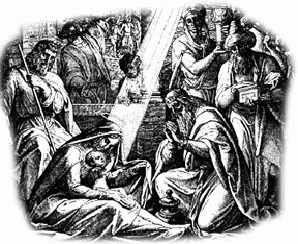
Saying, Where is he that is born King of the Jews? for we have seen his star in the east, and are come to worship him. Matthew 2:2
Everyone knew that a king was to be born. Herod knew it, the Magi, angels, and shepherds knew it. At Jesus’ triumphant entry into Jerusalem, thousands of people hailed him as the highest son of David, the Messiah, the King, the Anointed. Jesus said that it was for this cause that he came into the world and even the Procurator of Rome admitted that this was the King, and officially proclaimed it so on the epigraph nailed to the cross.
And a superscription also was written over him in letters of Greek, and Latin, and Hebrew, THIS IS THE KING OF THE JEWS. Luke 23:38
Jesus was the Messiah, the Mashiyach, the Anointed. King David was also a Mashiyach, e.g., messiah, and was called that in the Hebrew many times in the Bible. Being anointed meant that he was the king. In the New Testament, the Greek word Christos means “Anointed”. When we say “Jesus Christ”, we are simply saying “Jesus the anointed King of Judea, the remnant of Israel.”
Zachariah, as high priest, was murdered while he was in the temple. This was part of a political coup. His son would have likely inherited that position until a new high priest could be chosen through the courts and villages of the people. The high priest, had been the highest servant in the network of ministers, chosen according to the congregations of tens.
New high priests had been appointed from the top and put in place, but that was all contrary to the precepts of the Kingdom. John was the rightful high priest until a replacement could be chosen, according to the law of consensus, through the congregations of tens and hundreds. He had moved the laver from the blood-defiled stone temple of Herod to the Jordan River, near the altar stones of Joshua, and was baptizing, washing, the people into the Kingdom of liberty and charity.
God never wanted a stone temple built. In the ancient times, the temple was a frame with tenting stretched over it, like flesh over the skeleton of a man. It moved from place to place in the kingdom. At the feasts, people would come for miles to pay homage to the God of liberty by giving charity, instead of taxes, and to renew old ties and make new ones in brotherhood. This helped keep the kingdom as one nation under God, indivisible, with liberty and justice for all, according to the perfect law of liberty.
When the temple was made of stone, it became centralized, cold, controlling, arrogant, and oppressive. God had also opposed the calling for a central government, a king, and his appointed administrators. He allowed men to centralize the power of their office as patriarchs. The Potestas had belonged in each family, in the Pater Familias, where God intended it to be. God warned that such desires would bring their own punishment.
The governmental system of Judea had become like the systems of the gentiles, where the voice of the people chose the ruling elite to make laws for an enfranchised citizenry, a subject people. The Kingdom of God had become upside-down. The people again needed redemption from their sins.
The people betrayed the truth of God’s love and believed the lie. They made men ‘lawmakers’ and ‘judges’, rulers and gods, of their lives. They did not walk with God, but with men. They coveted each others goods and served the institution they created with their own hands. The temple now forced the tithes and oppressed the people under taxes. Even worse, the people became weak, self-serving and disjointed.
Christ was the good shepherd that brought His flock together, ministering one to another and edifying God’s kingdom on earth in their hearts and in the world.
But speaking the truth in love, may grow up into him in all things, which is the head, [even] Christ: From whom the whole body fitly joined together and compacted by that which every joint supplieth, according to the effectual working in the measure of every part, maketh increase of the body unto the edifying of itself in love. Ephesians 4:15-16
Some had hoped that Hyrcanus would have been the awaited priest and king, but he became so unpopular that, at one of the feasts in Jerusalem, he was pelted by the people with palm leaves, an act of rebellion for which many were put to death. People had lost the understanding and knowledge of the Kingdom when they turned away from its ways. They continued to suffer under a strong delusion.